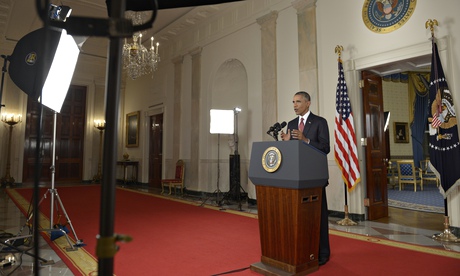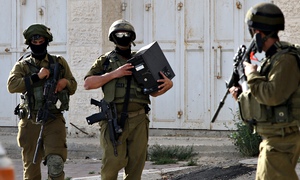The list of targets for the US air force inside Syria is long and varied. And just what US commanders choose to strike will give the clearest indication yet of whether Barack Obama intends to further the aims of the Syrian opposition, the regime itself, or neither.
Islamic State (Isis) is in command of much of eastern Syria, and has influence over a swathe of the north to near the fringes of Aleppo. The terror group has been advancing towards the Turkish border in its bid to secure an access route for foreigners to join the caliphate it is trying to impose across the Syria and Iraqi borders. At the same time, it has been trying to cut Syria in two, from the east to the west, giving it access to the Alawite heartland of Bashar al-Assad, and the Mediterranean coast.
Raqqa has been Isis's main centre of gravity, the only city in the country to have fallen completely outside the control of the Syrian regime. There the group has prospered, embedding itself within its heavily populated neighbourhoods and largely compliant population. Raids have been launched from Raqqa on nearby military bases; its leadership has been sheltered there; and hundreds of hostages, including at least 20 more western journalists and aid workers, have been hidden from view in the city's dense suburbs.
Since it was taken by Isis last year, Raqqa has been left unmolested by the Syrian military, which instead has deployed the full weight of its air force against other, non-jihadi, arms of the opposition closer to Aleppo. It is now a strategic base for Isis, where weapons seized from Iraq are stored, and leaders and senior members are able to run command centres that control battlefields as far away as Mosul and Baquba.
Raqqa will be of clear interest to US war planners, who in June tried – and failed – to rescue American hostages from a building on the outskirts of the city. Western governments believe that their captured nationals remain in, or around, there.
To the east, Isis is also in control of much of the city of Deir el-Zour, with Syrian troops confined to a last redoubt in a corner of the airport. Without support – which the Syrian air force has been unable to provide – they face the same fate as up to 800 troops and aircrew who were slaughtered by Isis when the Tabaqa airbase, a few hundred miles away, was overrun late last month. There will be pressure on the US to rescue the besieged Syrian forces with the same sort of precision strikes that saved the Kurdish peshmerga from a humiliating rout near Irbil in August.
Obama has said he will not coordinate raids with Assad. However, aiding helplessly surrounded rank-and-file troops could well be viewed as a humanitarian gesture. The bigger picture, though, appears to be how to stop Isis without delivering what remains of Syria to Assad and his chief patron, Iran.
Here the calculations become tricky. Does forcing Isis away from the eastern Syrian oil fields it captured last year benefit or harm Assad? The Syrian military has been buying crude from Isis for much of that time, and denying it access would cripple its war effort, unless Syrian forces are able to retake the fields themselves.
Similar decisions need to be made about how to deal with the threat that the jihadis will soon pose to the regime's main supply line from Hama to Aleppo. A major military base to the south of Aleppo is being menaced by both Isis and Jabhat al-Nusra, the al-Qaida group. Its fall would imperil not only Syrian forces in the area, but Alawites, Christians and Sunni towns and cities nearby.
Isis has given the Sunnis of Iraq and Syria a vehicle to further political interests they have long been denied by autocracy. Slowing its momentum would reduce its appeal. But without a plan to politically empower them, the region's Sunnis could instead see the attacks as an extension of an 11-year period that has emboldened Iran and the Arab Shias at their expense.























